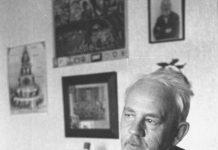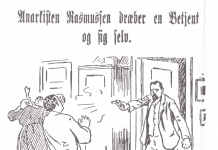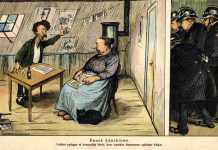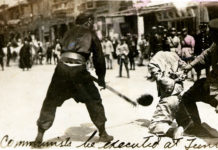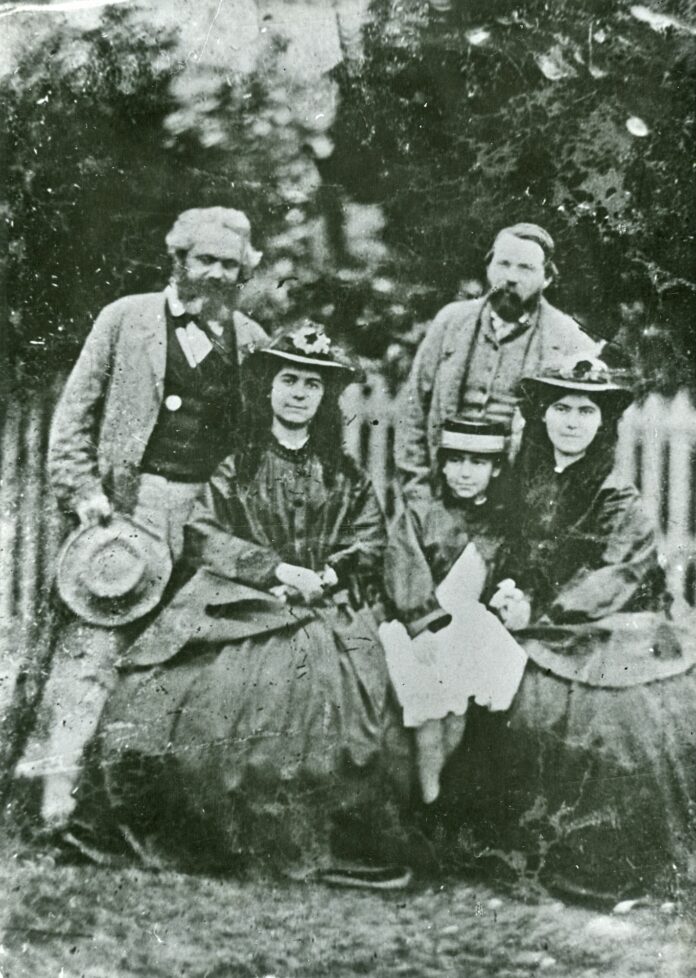
Socialistisk Biblioteks Tidslinje med links til begivenheder og personer i 1814.
Se også Index over personer, organisationer/partier og værker (som bøger, malerier, mm.), steder, begivenheder, mv., der er omtalt på hele Tidslinjen, titler og indhold på emnelisterne osv.
12. februar 1814
Jenny Marx (født von Westphalen) fødes i Saktzwedek (Sachsen-Anhalt, Tyskland). (Dør 2. december 1881 i London). Gift med Karl Marx 1843-1881, forlovet 1836.
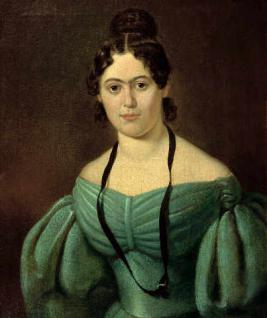
Links:
- Jenny von Westphalen (Wikipedia.org)
- Jenny von Westphalen (Marxists Internet Archive). With Correspondence
1839-1869 and Theatre Reviews.
The Life of Jenny Marx. By Harrison Fluss & Sam Miller (Jacobin: Reason in Revolt, 14 February 2016). “This Valentine’s Day, the life of Jenny Marx reminds us of the love it takes to be a revolutionary socialist.”
The triumphs of Karl and Jenny Marx. By Paul Le Blanc (SocialistWorker.org, March 13, 2012). Review of Mary Gabriel, Love and Capital: Karl and Jenny Marx and the Birth of a Revolution (Little, Brown and Company, 2011, 707 p.). See also review by Deborah Roberts: Family, life, and revolution (International Socialist Review, Issue 83, May 2012)
Se også:
- Emneoversigten: Marxisme / Marxism
- Tidslinjen: 5. maj 1818, om Karl Marx.
- Tidslinjen: 16. januar 1855, om Eleanor Marx, yngste datter.
17. maj 1814
Norsk uafhængighedsdag, Eidsvoll-forfatningen vedtages. Den såkaldte personalunion med Danmark (på norsk: 400-årsnatten) er forbi med den frie forfatning.
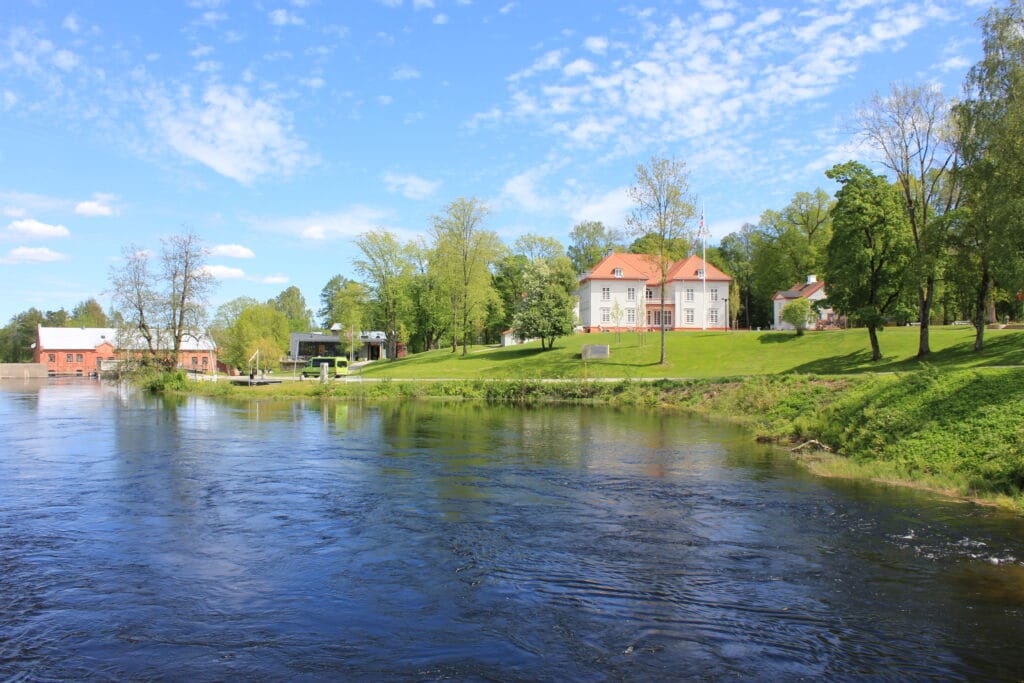
Leksika:
- 17. maj (Denstoredanske.dk)
- Riksforsamlingen av 1814 (NorgesLexis nettutgave av PaxLeksikon)
- Norges Grundlov (Wikipedia.no, bokmål)
- 1814 – en ny historiografi (Nasjonalbiblioteket; 1814 Bibliography)
- Eidsvollsbygningen (Norsk Wikipedia)
Artikler:
14. januar 1814: Danmark afstår Norge. Af Martin Hedlund Fink (Arbejderen.dk, 14. januar 2014)
Se også:
- Svensk-norske Union (Leksikon.org)
- Norge – historie (1814-1905) (Denstoredanske.dk)
30. maj 1814
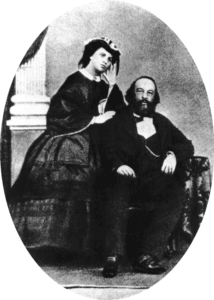
Anarkisten Mikhail Bakunin fødes i regionen Tver, nordvest for Moskva (dør 1. juli 1876 i Bern, Schweiz).
Biografier & bibliografier:
Dansk/skandinavisk:
- Bakunin, Mikail (Leksikon.org)
- Mikhail Bakunin (Denstoredanske)
- Mikhail Bakunin (Wikipedia.dk)
- Bakunin, Mikhail (Sorte Fane Blog). Oversigt over tekster på dansk + links.
- Gud og Staten (Norges Socialanarkistiske Forbunds Forlag, 1924; online på Runeberg.org, 2016).
In English:
- Bakunin, Michael (1814-1876). By George Woodcock (The Encyclopedia of Philosophy (Macmillan, 1967, Vol.1, p.244-246)
- Michael Bakunin (Wikipedia.org). Længere engelsk leksikon artikel.
- Michael Bakunin (Anarchy Archives). Incl. Biography, Collected Works, Bibliography, Commentary and Graphics.
- Mikhail Bakunin (Libcom.org). Articles about/by Bakunin.
- Mikhail Bakunin Reference Archive (Marxists Internet Archive). Incl. Biography by Brian Bagging + Works and Collections.
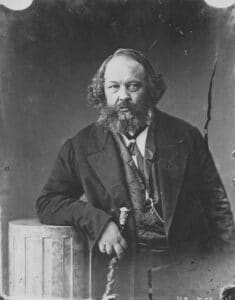
Debate:
Engels til Cuno, 24. januar 1872. I: Marx og Engels: Udvalgte Skrifter, bind 2 (Forlaget Tiden, København 1973, s.468-74; online på Marxisme.dk)
“At fortælle arbejderne, at de under alle omstændigheder skal afholde sig fra politik [ifølge denne bakunistiske teori], er det samme som at drive dem over i armene på præsterne eller bourgeoisrepublikanerne.”
In English:
The Conflict between Marx & Bakunin (Marxists Internet Archive; History of the International Workingmen’s Association). With articles and documents.
The Bakunin-Marx split in the 1st International. From chapter 13 in: Franz Mehring: Karl Marx: The Story of His Life (1918) (Libcom.org). “Mehring gives a very evenhanded account of the famous split that was to initially define the historical relationship between the statist and anti-statist wings of the working class movement.” På dansk: Kap. 13: ‘Internationale på sit højdepunkt’; side 425-476, -i: Karl Marx. Hans livs historie. Af Fránz Mehring. (Bibliotek Rhodos, 1976, bind 2).
When Marx was a reformist. By David Douglass (Weekly Worker, Issue 1086, 10 December 2015). Review of René Berthier, Social Democracy and Anarchism in the International Workers Association 1864-1877 (Merlin Press, 2015, 256 p.). See also Mike Macnair, Bakuninist hatchet job (Weekly Worker, Issue 1094, 18 February 2016)
Marx, Bakunin, and the question of authoritarianism (Libcom.org, December 2010). “David Adam casts doubt on the traditional narrative regarding the question of authoritarianism in the Marx-Bakunin conflict.”
Marx versus Bakunin. Part 1-5. By Alan Woods (In Defence of Marxism, 17 February – 9 March 2010). “It is fashionable to portray Marxism as the source of authoritarianism. This accusation is raised repeatedly by anarchists, reformists and all kinds of opportunists. Bakunin was one of the more famous exponents of such accusations.”
The philosophical roots of the Marx-Bakunin conflict. By Ann Robertson (What Next! No.27, December 2003). “As will be shown below, their foundational concepts are so incompatible that even their points of agreement are rendered more illusory than substantive.” And as an extensively annotated pamphlet (pdf) (Worker’s Action, 2009, 24 p.). See comments by Alan Woodward: Marx, Bakunin or what? (No.28, 2004).
Democracy or anarchism (Weekly Worker, Issue 398, September 6, 2001). “Eddie Ford looks at the ideas of Mikhail Bakunin”. See Letter from Andrew Flood (Issue 399, September 13, 2001).
A Marxist critique of Bakunin. By Louis Proyect (Anarchy Archives, 2000) (Anarchist Writers, 25 January 2011). “For many reasons, Bakunin is a good place to start in such an investigation. Not only is he a founding father of anarchism, his career developed partly as a series of ideological and organizational challenges to Marx.” See Reply from Iain Mckay (Anarchist Writers, 25 January 2011).
Bakunin vs. Marx. By Ulli Diemer (The Red Menace, Vol.2, No.2, Spring 1978) + Reply from Sam Dolgoff (Vol.3, No.1, Winter 1979). “I propose in this article to examine some of the most common anarchist objections to ‘Marxis'”.”
Se også/See also på Socialistisk Bibliotek:
- Emneoversigten: Anarkisme / Anarchism
- Linkboxen: Anarkisme vs. Marxisme / Anarchism vs. Marxism, med historiske debatter.
















